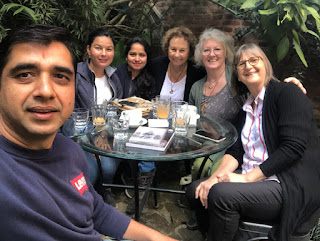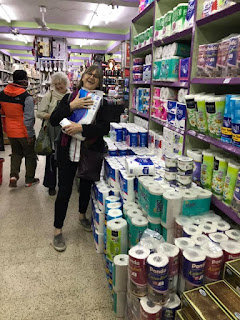Good grief! I hadn’t even realised I’d not finished the short series of daily blogs written during my trip to Nepal in 2020. I have only just re-read my experiences, and again feel the dis-ease and panic of the yet to evolve Covid pandemic, and our hastened exit from Kathmandu. I remember, while still there, feeling deprived but entertained by the excitement of fighting over loo roll, and of queuing at the supermarkets. On return to my village, I felt quite alien. I knew places and people were the same, but I deeply understood that everything had already changed.
We fared pretty badly, eh? There were incomprehensible accounts of women here in UK facing traumatic birth without their partners, facing heartbreaking loss at times, too. We saw photos of birth workers sweating and fearful behind swathes of plastic gowns and alienating armour. They learnt to 'hold' each other from 2 meters away, and to smile and reassure through their eyes.
Antenatal care and education was dropped like hot potatoes. Phone lines were jammed and midwives were unreachable. Breastfeeding support was via zoom, if you were lucky. New parents tried to hold it together, together, because there was no family, no well meaning aunts or grandmas. Nobody.
Like here, Nepal had waves of Covid. Many of the cases arrived from the Indian border, with migrant workers forced to return home to their remote villages. Who knows how they fared in their isolated villages, many without medicine. Lockdown in Kathmandu was enforced by the army, and I think it had to be so. There was no luxury of ‘working from home’, and socially distancing in a small 570 sq km space with 2,220,436 people must have been near impossible.
I saw photos of the Kathmandu hospitals managing PPE. I heard stories of women being denied entry to birth in the hospitals. The Covid Delta strain is particularly severe for pregnant women, and we saw scenes of wood being sourced for the many funeral pyres. I think we all imagined ourselves in the position of having to find black market Oxygen for our mothers, and of caring for loved ones with a concern that no help would arrive.
Maternal and neonatal mortality has obviously taken a huge knock, and the chances of reaching the Sustainable Development Goals seem ever more remote (It does for us all!), but there were heart warming stories and the potential for providing true midwifery care was grabbed with both hands by a few of Nepal’s new midwives.
 |
| Sabita, Prasansha, and Rukumani. Three of Nepal's first midwives. |
During lock down there was no transport for women, and no advice for emergency care. So, a few of the midwives started up an emergency hotline, and counselled almost 3,000 women. They also provided video and zoom, gave antenatal education, and carried out some face to face care where necessary.
At first, the midwives shared their personal phone numbers, but help came in the way of Midwifery Society of Nepal (MIDSON), and Dr Laxmi Tamang, and the service became a national, toll free hotline. UNFPA and other organisations supported the midwives to continue this work. Other projects stepped up to support families isolated during the pandemic. My midwife friends Prasansha Budha, and Sabita Kadka put their energies into an organisation called ‘Rural Community Healthcare Nepal’. They created a large project supporting childbirth education for young people. Prasansha and Sabita came across many situations of isolation and deprivation, and I wanted to help them to help these families. My funds from selling hand painted advent candles the previous year were still unused because the return trip I’d planned and hoped for, didn't happen. I took the decision to send this money out to the organisation, and for the midwives to oversee how it was spent.
Here are a few heart warming cases Prasansha, Sabita, and the families involved, are happy to share.
Case 1.
Twin girls born naturally to a second time 20 year old mother, at 38 weeks gestation, and into a very poor family. They weighed 2300g and 1800g, and the parents had no clothes for them. They were given blankets and clothes. Travel restrictions sadly denied Sabita the chance to support the family further, or ask about the welfare of the little baby girls.
Case 2.
Prasansha was made aware of a 19 year old deaf woman. The
young woman had grown up in an orphanage and had no memory of her birth place
or family. She married a lad, also from the orphanage, but he died recently.
Prasansha oversaw her pregnancy care, and liaised with doctors and social
workers to get the birth, transport costs, clothes and food the mother required.
Through what sounds like a long latent labour, Prasansha offered overnight
support before advising hospital, and the baby boy was born ‘on the bed’ (this
presumably means without lithotomy?? Or does it mean vaginal birth rather than
CS? I’ll find out!), without episiotomy, after having back and thigh massage to
help with the pain. The female staff supported the new mum with postnatal care
that would have normally been given by family. 
The young mother was set up with a rented room, money to buy food, and found support from a women’s group. She was also gifted a small street cart by another donor, to start her own self sufficient business. What a lovely, positive, story.
Case 3.
A mother with 4 children, and a drunken husband! She was malnourished, and had no money for food to feed herself or her children.
Case 4.A woman with two children already, arrived from a remote region in eastern Nepal. She had no screening tests earlier in the pregnancy and admission tests found she was Hepatitis B positive. The couple couldn’t afford medication to prevent their baby becoming poorly, and the hospital had no funding to support this, so Prasansha requested the purchase of the necessary drugs to keep this baby as well as could be. She said the parents were so worried, and so grateful for the support.
Case 5.Only relevant for the wonderful comment Prasansha sent to me.....
She had instructed a poor birthing woman’s husband to get his wife a hot drink. He said he had no money, but was visibly drunk. His excuse was that he was ‘in stress for his wife’. Prasansha gently warned him, and then gave the couple enough money for food during their hospital stay, and ensured they had adequate clothes for the baby. I love that he was ‘gently warned’.The midwives managed the funds by purchasing both clothing packages and food packages and ensuring they were available in a few places for the poorest mothers. There are any number of ways to spend funds to great effect in Nepal. I personally would like to see these midwives have adequate equipment and ongoing educational development. But amidst a pandemic, and faced with some of the worlds poorest women, I think my priorities could change. Maybe I can direct some funds to keeping the midwives cared for, loved, and equipped.
Covid 19 has halted plans for so many of us. Midwifery education will resume in Nepal, and the qualifying midwives will be employed in the many birthing units that government plans to set up. Maternal mortality in Nepal must decrease from 239 to 70 in 100,00 births within just a few years if it's to meet Sustainable Development Goals. Government really needs to pull it's socks up, and recognise women's health as the serious issue that it is. I thank everyone who has helped me to help the midwives of Nepal to help women's health, one mother at a time. In doing this, they are also gently nudging the country to better, holistic, respectful care for birthing women. They are being the change we all want to see.



































